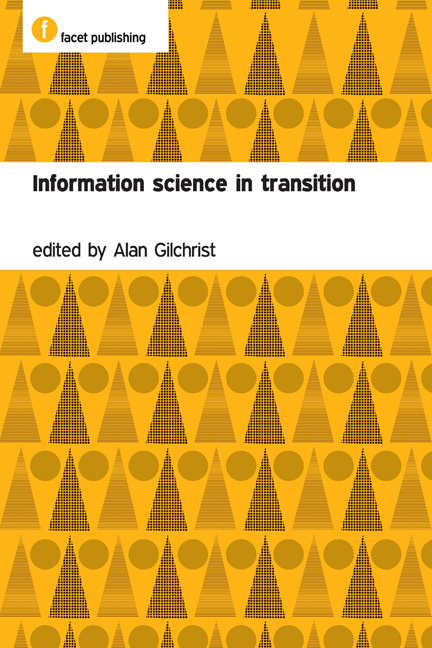Book contents
- Frontmatter
- Contents
- Contributors
- Preface
- Editorial
- Guest Editorial: Meeting the challenge
- 1 Fifty years of UK research in information science
- 2 Smoother pebbles and the shoulders of giants: the developing foundations of information science
- 3 The last 50 years of knowledge organization: a journey through my personal archives
- 4 On the history of evaluation in IR
- 5 The information user: past, present and future
- 6 The sociological turn in information science
- 7 From chemical documentation to chemoinformatics: 50 years of chemical information science
- 8 Health informatics: current issues and challenges
- 9 Social informatics and sociotechnical research – a view from the UK
- 10 The evolution of visual information retrieval
- 11 Information policies: yesterday, today, tomorrow
- 12 The disparity in professional qualifications and progress in information handling: a European perspective
- 13 Electronic scholarly publishing and Open Access
- 14 Social software: fun and games, or business tools?
- 15 Bibliometrics to webometrics
- 16 How I learned to love the Brits
- Index
1 - Fifty years of UK research in information science
Published online by Cambridge University Press: 08 June 2018
- Frontmatter
- Contents
- Contributors
- Preface
- Editorial
- Guest Editorial: Meeting the challenge
- 1 Fifty years of UK research in information science
- 2 Smoother pebbles and the shoulders of giants: the developing foundations of information science
- 3 The last 50 years of knowledge organization: a journey through my personal archives
- 4 On the history of evaluation in IR
- 5 The information user: past, present and future
- 6 The sociological turn in information science
- 7 From chemical documentation to chemoinformatics: 50 years of chemical information science
- 8 Health informatics: current issues and challenges
- 9 Social informatics and sociotechnical research – a view from the UK
- 10 The evolution of visual information retrieval
- 11 Information policies: yesterday, today, tomorrow
- 12 The disparity in professional qualifications and progress in information handling: a European perspective
- 13 Electronic scholarly publishing and Open Access
- 14 Social software: fun and games, or business tools?
- 15 Bibliometrics to webometrics
- 16 How I learned to love the Brits
- Index
Summary
Abstract
An attempt is made to discern the main research themes in British information science over the past half-century. Within these themes, emphasis is placed on research in the UK that has had some impact on the international information science community. The major factors that have influenced information science research in the UK are also briefly considered.
Introduction
Research that clearly falls under the ‘information science’ heading was already being carried out in the UK in the first half of the twentieth century, though the volume of such research was small. It was in the second half of the century that systematic research in this field – and, indeed, the name itself – became fully established, and that the amount of research began to grow rapidly. Today, information science has matured to the stage where even the study of its history has become a legitimate topic for research [1]. A definition of information science acceptable to everyone has always proved difficult to find, from the early days right up to the present. There has, however, been greater agreement on what are the important topics that information scientists should study: most of the topics mentioned in the early days are still regarded as important today, though relative emphases have changed. The development of information science research – as with most science and social science subjects – is reflected reasonably well by the changing nature of the research papers published in its leading journals. So I have used these as my main guide to UK research over the past half century.
The UK is fortunate in possessing a number of internationally recognized journals that cover library and information science research. These, and especially the Journal of Information Science and the Journal of Documentation, have published a wide variety of research by British information scientists over the past 50 years. The contents of the Journal of Information Science cover all areas of the field and little that is not relevant, but it only started publication in 1979. The Journal of Documentation gives better time coverage, since it goes back beyond the beginning of the period discussed here.
- Type
- Chapter
- Information
- Information Science in Transition , pp. 1 - 22Publisher: FacetPrint publication year: 2009



